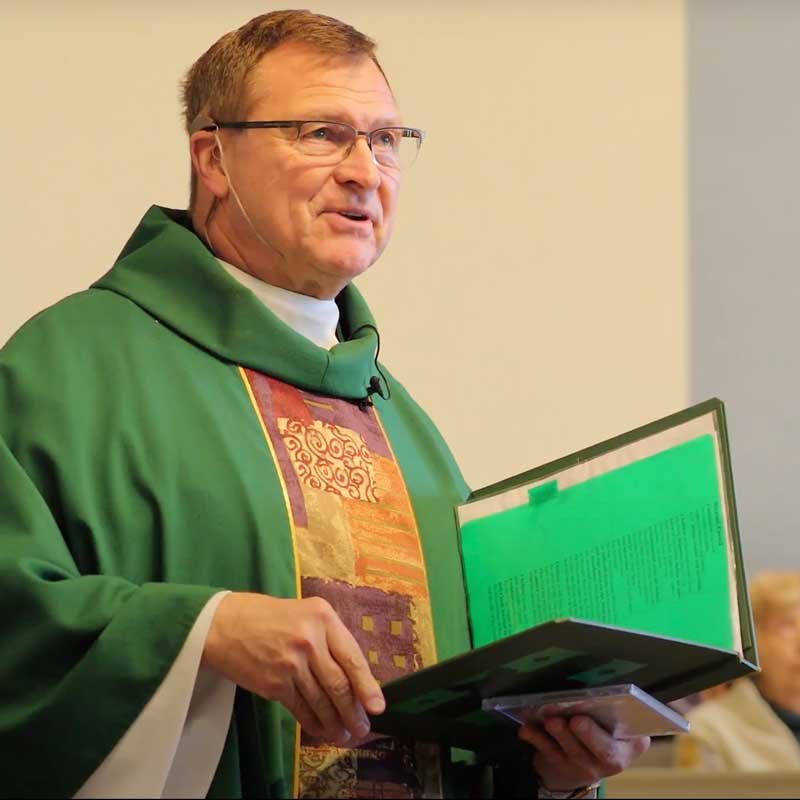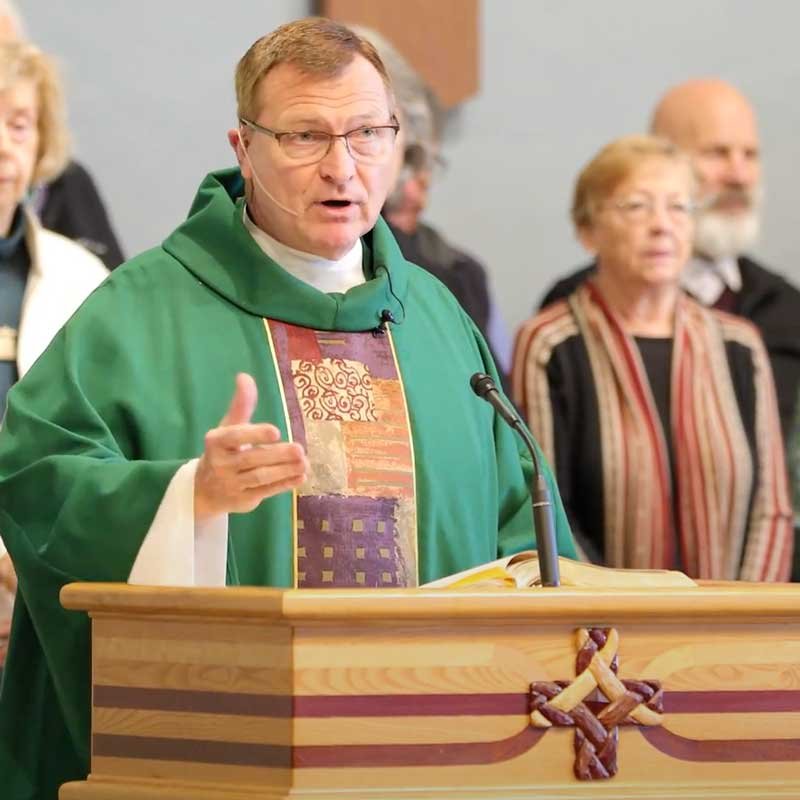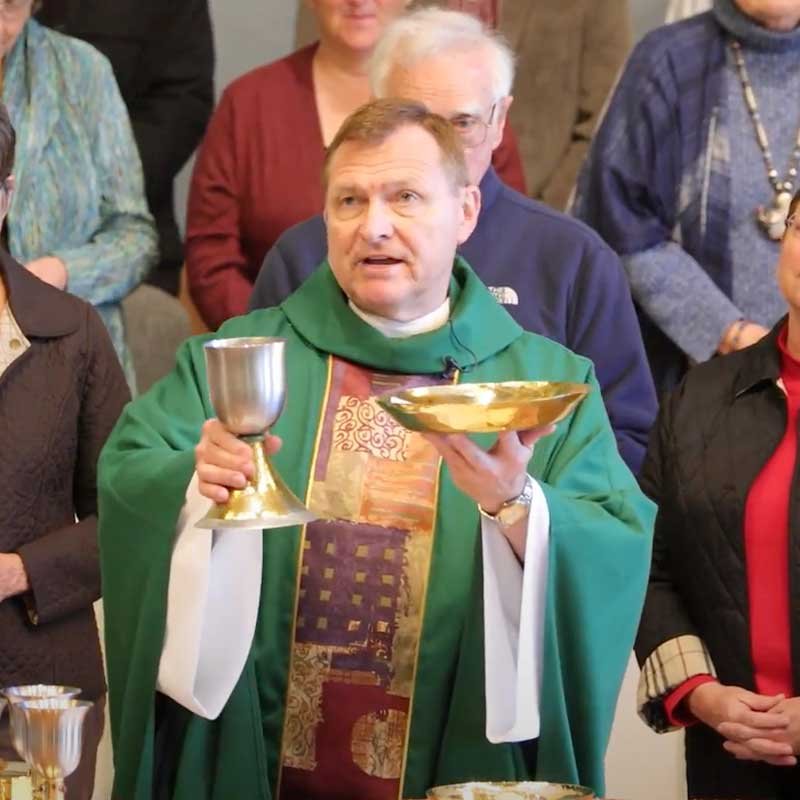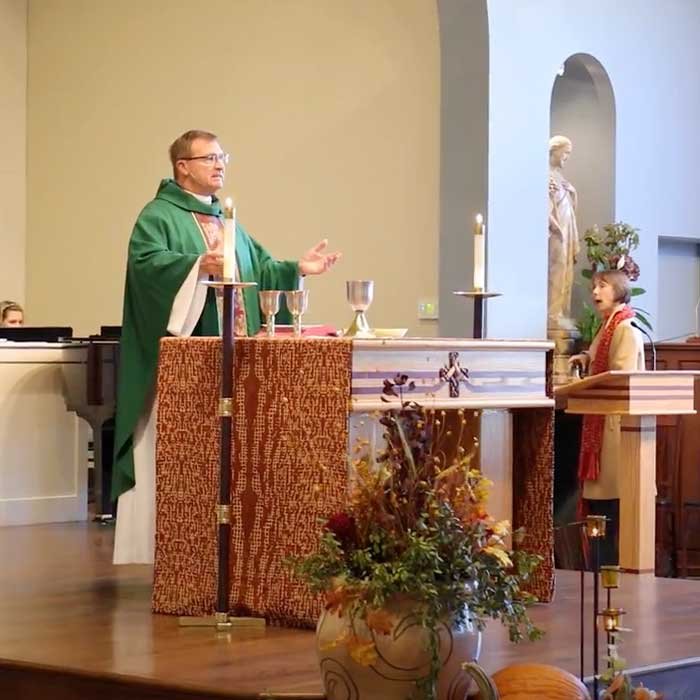MR: In terms of the practice of preaching, are there things that just don’t work for you? It may work for somebody else, but not—I will give you an example. Humor is extraordinarily difficult to pull off. When you think about it, the best you know, comic geniuses often come from Harvard and they do writing for Conan O’Brien or whoever. But, actually telling the joke, or making the humorous point, is a very difficult thing to do.
JK: It is. I know there are some preachers that start every homily you know, with a joke. That’s not a style that works with me. On the other hand, the humorous moment has worked very effectively, and—but that’s judiciously chosen and selected. That’s part of that variety that I was telling you about. So, there is an occasion, you know, where humor is good. Even finding the humor in the gospel, you know the woman that begs the judge for a hearing—you know, there is humor in that. Being able to point that out to people. On the other hand, some homilies are going to be catechetical or didactic or you know, each homily has it’s own purpose and function. When you are dealing with a community Sunday after Sunday, year after year, that you have to bring some sense of variety so that it’s not oh, it’s the same old stuff each week.
MR: So, tell us a little bit about yourself. You are originally from Detroit?
JK: Toledo.
MR: Toledo, Ohio. Excuse me.
JK: Very close to Detroit.
MR: Very close. Your name is John Kasper OSFS. Could you explain what OSFS is?
JK: Oblates of St. Francis de Sales.
MR: And who was he?
JK: St. Francis de Sales was the missionary to the Chablis. He grew up in France in the 16th century, born in 1567, the area called Savoy. He was bishop of Geneva. He was the author of two of the great Christian classics; the Introduction to the Devout Life, and the two-part book the Treatise on the Love of God. Long before Vatican II talked about the spirituality of the laity, that everyone is called by God to Christian living. He wrote a book, the Introduction to the Devout Life that stated just that. Whether you were the cook in the scullery or the servant or whether you were the prince of the court of the bishop—there is an appropriate spirituality, a way to live out your Christian living.
MR: Where did you attend the seminary?
JK: Niagara University, Niagara Falls, New York, undergraduate. The Toronto School of Theology, St. Michael’s College in Toronto.
MR: Was there any particular priest or preacher that inspired you at that time when you were a younger priest?
JK: I have a list that reads like a litany of mentors that I have had from my earliest seminary days. As I look back on them in preparation for our dialogue today, I recognized each one of them brought a different gift to my understanding of the task of preaching and the ministry of preaching You know, one guy touched the humanity of people and he was able to use humor very, very effectively. Another that I worked with in campus ministry as a seminary and a deacon, he had just a well read knowledge and encyclopedic knowledge, and he challenged the intellect and really made you think. Another that was a supervisor when I was a student teacher in my order, creativity was his gift. Looking for unique ways to make the word come alive. So again, a litany of examples and models and mentors of you know, effective preaching.
MR: We are taping this just after Mother’s Day, and it always strikes me that one of the things we don’t have in the Catholic liturgy are women’s voices, which is unfortunate. I think women preaching would be very effective, given the circumstance. What’s your thought on that?
JK: I just discovered a website—well, it’s FutureChurch is the organization, and they have put on their website videos called Women Preach. It’s different women—lay women—religious women—each Sunday that take the scripture and model preaching for that. You are right, the voice of women—we have got to find ways to bring that in. Sometimes the most effective response I have received has been from women when I have addressed, to the best of my ability, and limited ability as a man, women’s concerns or lifted up for the congregation’s consideration the important contribution and gift that women bring to the church.
MR: You bring a lot to this church environment here, and you have done great work with what was I think a gym at one point, and has now been transmuted into a worship space. You have redone the multimedia here. You have the ability to show on screen the lyrics of the hymns and also do other kind of creative work with music. Developing that richness really means a team of people. You can’t do it yourself. Over twenty years you have been able to do that pretty effectively. Do you have any suggestions to rookie pastors to get that started?
JK: The church is a round table and everybody needs to be at that table. I think as a pastor you need to listen to the voices of the people. If we really believe Paul’s analogy of the body and the eye can’t say to the foot, “I don’t need you.” Then, we need to bring everybody and appreciate the gifts and talents that are already there. Collegiality is a crucial part. Pope Francis has emphasized synodality and listening to the voices, expanding the voices so that many voices can be heard in the church. So yes, that’s your starting point because people bring far greater gifts than I have and it’s the job of a pastor, I think, to kind of be a facilitator and find effective ways to bring that together.
MR: Now, over these many years I am assuming you have a large file of past homilies? Do you keep that stuff?
JK: Oh, I do. Thank goodness. You know, we have the gift of laptops and we can collect that data very easily. So, I do have the homilies that I have done and you are right, you can only repeat so many times, but you can take a theme that you have used and clothe it again in a different way, in a different setting, new time, a new period. So yes, I definitely rely on that
MR: Well, it’s writing and rewriting in so many different ways. You can, in effect, put an example in that may not have happened three years ago, but like this week, but it fits very perfectly within the context of the scripture and what have you.
JK: Exactly. I am not an original thinker or an original writer. I think that’s a rare gift to have. But, I use the term of being a hunter and a gatherer. So, as a priest, a minister, I have both the responsibility as well as the luxury to be able to search resources that parishioners wouldn’t have access to, or wouldn’t know about. So, I can hunt though things and then gather them together in a way that can share that wisdom about scripture, about theology, about catechetics and so on, and put that together in a cohesive way and share that with the community.
MR: You have a gifted community of listeners, people who would probably follow books you recommend and films you have seen and take part of the larger life of the community and of who they are.
JK: You know, incarnational preaching, I think that’s the basis of it. Finding God in daily living or in all the things that affect our lives. I always look to the example of Christ in the gospels. You know, Jesus never used theological language or jargon. He looked around and he saw a farmer sowing seed. That was the content of his preaching. He saw a woman who lost a coin and is searching for it. That’s his content. He saw people that were hungry on the hillside. So, he looked at the world around him, and he found the presence of God in those situations and for me, that ought to be the preacher’s task. To look at the world around and then where do we see the spirit of God at work there, and lift that up for people’s consideration.






